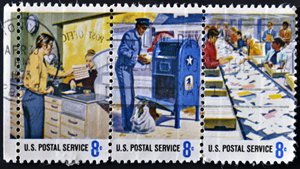Rain and Sleet May Not Stop the Mail but Lack of Innovation and Congress Might

As an independent agency of government, the Postal Service faces a double quandary amid a mounting cash shortage that could drive it into default. It doesn’t get taxpayer dollars, but its efforts to creatively cut costs are stymied by Congressional approval. Serving a diverse nation with rural pockets that rely on physical post offices complicates the problem, as slashing the lowest revenue makers would cripple communities. As the Postal Service struggles to maintain its core mission of delivering the mail everywhere in the U.S., Congress is quashing its innovative attempts to stave off further losses and keep it vital for years to come.
Long heralded as a ubiquitous part of American society, the letter carrier has been trounced by more nimble models such as FedEx and UPS, as well as the Internet. The Postal Service is legally obligated to send a first-class letter anywhere in the U.S. for just 45 cents, while FedEx and UPS don’t have to do business in remote areas that offer no monetary incentive. First-class mail, which makes up the bulk of the Postal Service revenue, plunged 28% to 73 billion pieces of mail last year, from a record of 102 billion in 2002, and is forecast to plummet another 30% by 2016.
It’s up to the Postal Service to find a way to stay in business, but Congress has been dragging its feet. Any innovative measures to stem the bleeding are choked by laws and regulations. The agency can’t cease Saturday delivery without the green light from Congress, and it can’t slow mail delivery without regulatory permission. Furthermore, Congress has refused to defer the payments due today, as it did last year. The Postal Service says it can’t afford two legally enforced payments for future postal retirees’ health benefits: $5.5 billion due today, and $5.6 billion due in September.
Fredric Rolando, president of the National Association of Letter Carriers, blames Congress for mandating the payments in 2006, claiming they thrust the post office into a yearly “panic mode that absorbs energy and resources” instead of permitting longer-term innovation. “The word `default’ sounds ominous, but in reality this is a default on the part of Congress,” he said. It’s hard to fault the postal workers in America’s tiny towns, but some of their potential solutions are absurd, at best. Linda Graham, a postmaster in Hope, Alaska, told The Associated Press that she tells people to “write more letters, buy more stamps.”
No amount of stamp sales will erase the red ink. Congress must work with the Postal Service to allow it to make innovative changes that can eventually return the agency to profitability. The Postal Service has vowed to deliver mail and packages and to pay employees and vendors, despite the threat of defaults. But no quick fix will do. The Postal Service is a traditional business, and traditional business practices do not stress the need for agility and innovation. It must continue to do its most basic job, while finding new ways to make money. Like any business, and in spite of Congressional and regulatory hurdles, the Postal Service must understand its business mission and embrace the technologies that enable it in order to survive for now, and eventually thrive, in an increasingly competitive and quickly changing environment.
The challenge is magnified within an organization that includes hamlets that rely on its 45 cent promise, as well as cities where most residents could live without it. The demands and expectations of each employee, from the rural postmaster up, are very different. Convergence can only occur if the Postal Service establishes an organizational structure, process, information flow and automation that unite decision-making from the Postmaster General, the chief executive officer of the United States Postal Service, to every postmaster and letter carrier throughout the country. Every member of a converged organization must work together knowing what resources are available and what is required to act on any opportunity or threat. Right now it seems the threats are outweighing any potential for growth, or even survival. Like any enterprise, public or private, the Postal Service can only transform when it has successfully launched a new course to achieve its goals. That course can’t come without Congressional cooperation.
#####
Faisal Hoque (faisalhoque.com) is Founder, Chairman, and CEO at BTM Corporation(www.btmcorporation.com) and founder of research think-tank BTM Institute (www.btminstitute.org). His newest book is The Power of Convergence (www.thepowerofconvergence.com). Follow him on Twitter @faisal_hoque (https://twitter.com/#!/faisal_hoque). © 2012 Faisal Hoque












